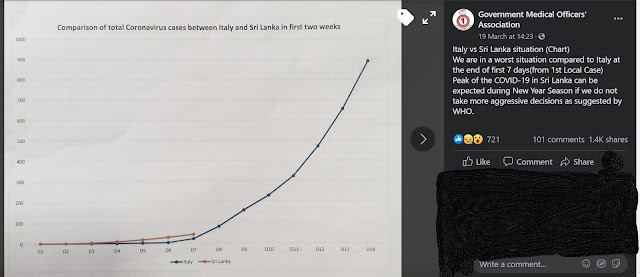Coronavirus: Lessons from Around the World
The relative successes or failures in different countries around the world have shown that it comes down to a few factors and how well the authorities/government adapt their strategies taking these factors in to account:
- Swift and early action. It has become clear that the earlier the response the less drastic the measures have to be. Taiwan, a densely populated country with 24mn people just 130 km away from China, is a good example. Taiwan began screening arrivals from Wuhan (China) within a week since the WHO was informed of the virus by China. The government also implemented a number of safety protocols together with extensive educational outreach. To date, there have been only 235 cases & 2 deaths in Taiwan, despite the lack of very restrictive curfews or lockdowns. The Sri Lankan government also acted early relative to the start of the outbreak there, albeit with more restrictive measures going to the extent of a curfew, and so far has managed to achieve great success in controlling the local spread of the virus. This contrasts sharply with Western Europe, whose governments were slow to react and where the virus has hit with devastating force despite the highly developed healthcare systems. The United States is a similar case in point, where the number of infections has started to rapidly accelerate over the past week.(Sources:[1] https://www.businessinsider.de/international/coronavirus-taiwan-case-study-rapid-response-containment-2020-3/?r=US&IR=T, [2] https://www.theguardian.com/world/2020/mar/21/coronavirus-asia-acted-west-dithered-hong-kong-taiwan-europe)
- Widespread testing and tracing. South Korea at one point had the largest outbreak outside China, which seemed to spiral out of control. However with quickly developed tests carried out on a massive scale, they managed to flatten the curve and control the outbreak within weeks. What's even more remarkable is that South Korea didn't even resort to drastic lockdowns that have become necessary elsewhere.
(Sources: 2, [3] https://www.nytimes.com/2020/03/23/world/asia/coronavirus-south-korea-flatten-curve.html, [4] https://www.aljazeera.com/news/2020/03/south-korea-coronavirus-lessons-quick-easy-tests-monitoring-200319011438619.html) - Health infrastructure. The existing public health infrastructure is naturally a big factor in deciding the response of any country. Taiwan, South Korea & Japan all have highly developed public health infrastructure which has certainly helped them in controlling the epidemic. However, the situation in Europe shows that having the infrastructure doesn't necessarily guarantee success and that timely action is of critical importance.
- Previous experience with similar outbreaks. This is obviously something a country would rather not have. However it is seen the authorities as well as people who have had experience with similar previous outbreaks are better prepared to face the crisis. Therefore it makes common sense for others to take those learnings and use them to shape their policies and action plans. Both Taiwan and South Korea suffered badly from the 2002 SARS epidemic and hard lessons had been learnt. (Sources: 2, [5] https://www.aljazeera.com/news/2020/03/taiwan-reins-spread-coronavirus-countries-stumble-200307034353325.html
- Cultural attitudes. Certain attitudes of people have also been seen to play a part. For example in Japan, where people are inherently very respectful of others and are careful not to do anything that might put someone else at risk, people have resorted to wearing masks in public even without enforcement by authorities. It's rather a cultural enforcement where someone who doesn't comply is met with immediate disapproval.
- Socio-economic factors. The counter measure taken will affect and impact people differently depending on their occupations, income levels, educational levels etc. The more drastic the measures are the higher the impact will be. To take one example, in countries like India and Sri Lanka, there are large numbers of people on daily and informal wages without any other social security who would be badly affected by a prolonged curfew. This and other similar issues need to be addressed.

Comments
Post a Comment